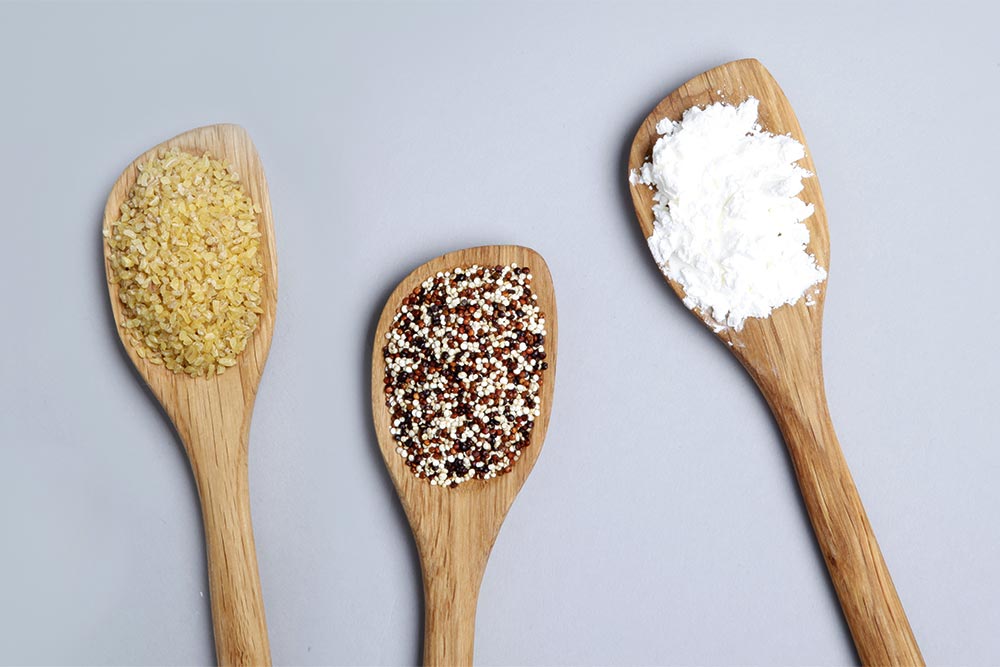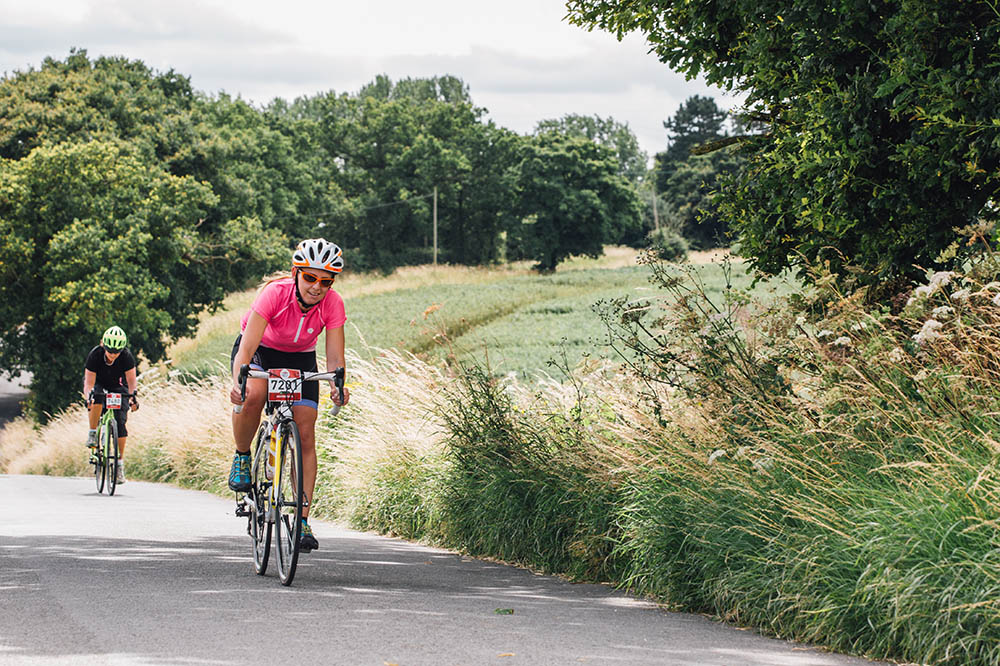Is a gluten-free diet beneficial for cyclists?
Would ditching gluten from your diet make you a better cyclist? We explain what gluten is and why some cyclists could benefit from cutting it out of their food


Gluten-free grains
The latest race content, interviews, features, reviews and expert buying guides, direct to your inbox!
You are now subscribed
Your newsletter sign-up was successful
By Laura Tilt
Gluten has become a bit of a dirty word in recent years, blamed for everything from bloating to brain fog, and worse still, inflammation.
If you’re not already going gluten-free, chances are you’ve thought about it — and you’re not alone. In 2012, the University of Colorado surveyed almost 300 endurance cyclists, finding that gluten-free was the most popular ‘special’ diet. More interesting was that of the gluten-free cyclists, 84 per cent reported that going ‘off’ diet resulted in symptoms that negatively affected their training.
Although the medical profession doesn’t support gluten-free diets for people without coeliac disease (an autoimmune condition where the body attacks the small intestine when gluten is eaten), the idea that gluten-free diets can boost performance is so widespread that many cyclists have jumped on board.
There’s no doubt it’s tempting to give gluten-free a go. But are we simply falling for another fad?
What is gluten anyway?
Gluten is a group of proteins found in the cereal grains wheat, rye and barley. This means all foods containing these grains also contain gluten, including bread, pasta, breakfast cereal, crackers, flour, cakes and biscuits.
The latest race content, interviews, features, reviews and expert buying guides, direct to your inbox!
Although it’s developed a bad reputation, gluten actually plays an important role in food production — it’s the stretchy protein that allows dough to rise, giving bread its springy, elastic texture — if you’ve ever eaten a gluten-free loaf, you’ll know the difference – it lacks density and chewiness.
For a small percentage of people, gluten has to be avoided. Around one in 100 people have coeliac disease, a condition where gluten triggers an overactive immune response, causing damage to the lining of the small intestine, which affects the way food is absorbed. This leads to symptoms like weight loss, bloating, diarrhoea, anaemia and tiredness. Other symptoms such as brain fog, mouth ulcers and skin rash, are less common, but can be a hallmark of the undiagnosed disease.

A further five to 10 per cent of people are estimated to have ‘non-coeliac gluten sensitivity’, a condition where coeliac-like symptoms are experienced when eating gluten, although there is no evidence of damage to the gut.
That’s a possible 10 per cent of the population who might benefit from a gluten-free diet — so what about everyone else, and in particular, cyclists?
Gluten and cycling
The number of pro cyclists turning to gluten-free diets has jumped in recent years, thanks to the idea that ditching gluten can give performance a boost. There’s no doubt that this movement has been reinforced by teams like Garmin, who switched to a gluten-free diet pre-Tour in 2010, under the direction of the team’s CEO and exercise physiologist.
So what is it that drives the decision? According to results from surveys and team interviews, it comes from the perception that gluten triggers inflammation in the gut, leading to symptoms that affect training. Although there is no strong evidence for this in people without coeliac disease, it’s an attractive selling point for cyclists, because around 70 per cent of endurance athletes who compete at recreational level report digestive symptoms.
>>> This is what you have to eat to compete in the Tour de France
Blaming digestive troubles on gluten is easy, but there are other explanations. The large amount of carbohydrates that are needed to fuel long cycling sessions can cause bloating and diarrhoea, as some groups of sugars are poorly absorbed by the small intestine. Intense exercise itself can also trigger inflammation in the gut, because blood flow is directed away from the digestive system to the muscles. This could potentially trigger digestive symptoms.
So could a gluten-free diet help? In a recent attempt to settle the score on gluten-free diets and performance, scientists at the University of Colorado studied the effects of a short-term gluten-free diet in a group of non-coeliac competitive cyclists, who had no history of irritable bowel symptoms.
For seven days, the cyclists were given either a gluten-free or gluten-containing diet during alongside normal training, performing a 45-minute steady-state ride and 15-minute time trial on day seven. The cyclists then underwent a washout period before repeating the trial — this time under the opposite condition, although they were blinded to the order. To keep things as valid as possible, the gluten was hidden in food bars, which were eaten twice daily.
During the study researchers monitored cycling performance, digestion and inflammation markers. The results showed no difference between the two diets on any marker of performance, digestive health or inflammation.
Although longer-term studies are needed, this puts at least one nail in the coffin for gluten-free diets and performance.
So are there any benefits to giving it up?
If you’re diagnosed coeliac, a gluten-free diet is the only treatment. In people with non-coeliac gluten sensitivity, removing gluten may benefit symptoms, although it’s important to have coeliac disease ruled out before you eliminate foods.
>>> Essential guide to superfoods
For everyone else, the benefits are dubious. Claims of weight loss with a gluten-free diet are common, but this is usually just a side-effect of cutting out calorie dense foods like cake and biscuits.
There’s also no evidence that a gluten-free diet is healthier — it can often lead to an overreliance on processed food; plus studies show long-term gluten-free diets tend to be low in fibre, B vitamins, iron and zinc — all linked with energy production and performance.

What if I’m not coeliac, but I feel better eating gluten-free?
If going gluten-free means you end up eating more fruit, veg and less processed and junk foods, chances are you will feel better — it could be nothing to do with the lack of gluten in your new diet.
There are also those who experience symptoms when eating wheat, not because of gluten but because of a group of carbohydrates known as FODMAPs — sugars which are poorly absorbed, leading to gas, bloating and pain.
Scientists also describe something called the belief effect, whereby if you think a particular diet is going to make you a better cyclist, performance can actually improve by one-three per cent.
Following a gluten-free diet as a cyclist
There is nothing wrong with following a gluten-free diet, but for many people it’s just not necessary. If you do feel strongly about doing so, the most important thing is to plan it well so that it doesn’t end up being overly restricted or deficient in nutrients. It’s also worth thinking about how easy it will be to access food when you’re travelling or competing.
The main consideration for any cyclist is getting enough carbohydrate to fuel training. Gluten-free means no wheat based breakfast cereal, bread, or pasta, so you need to make sure you replace whatever you exclude.
If do go gluten-free, start by basing your diet around gluten-free whole foods (meat, fish, fruit and vegetables, rice, potatoes, lentils) and then build in enough extra carbohydrate to fuel your training, including high carb choices at each meal, and pre and post training.
Gluten-free food swaps
| Row 0 - Cell 0 | Instead of | Try |
| Breakfast | Weetabix | Oats, Rice Krispies |
| Lunch | Bread | Corn cakes or rice cakes |
| Dinner | Pasta | Rice or potatoes or gluten-free pasta |
| Snacks | Toast, biscuits, malt loaf | Flapjack, fruit, yoghurt, trek bars |
Why gluten-free?
In a survey of athletes, the most popular reasons for going gluten-free were the belief that the gluten-free diet is healthier, lowers inflammation, reduces digestive problems and improves performance.
Gluten-free grains
Committed to going gluten-free? Try these high-carb alternatives; quinoa, rice, potatoes, oats, teff, buckwheat, amaranth, corn (tortillas, corn bread and popcorn) plus gluten-free flours and pulses.
Tummy troubles?
Don’t automatically hold gluten to ransom – around 1 in 100 people have coeliac disease, but it could be something else. Wheat and rye contain FODMAPs — short-chain sugars that can trigger gut symptoms. Speak to your doctor to exclude coeliac disease then consider the help of a FODMAP trained dietitian.
Michelle Arthurs-Brennan the Editor of Cycling Weekly website. An NCTJ qualified traditional journalist by trade, Michelle began her career working for local newspapers. She's worked within the cycling industry since 2012, and joined the Cycling Weekly team in 2017, having previously been Editor at Total Women's Cycling. Prior to welcoming her first daughter in 2022, Michelle raced on the road, track, and in time trials, and still rides as much as she can - albeit a fair proportion indoors, for now.
Michelle is on maternity leave from April 2025 until spring 2026.
